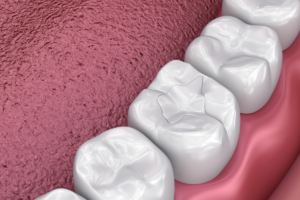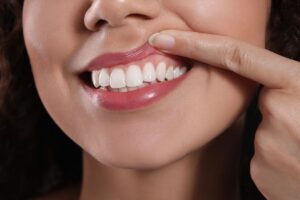Do you find yourself wincing when you take a sip of your favorite ice-cold drink or cringing while indulging in a sweet treat? If so, you’re not alone. Sensitive teeth can put a damper on even the most enjoyable culinary experiences. But fear not, for in this article, we’re delving into the world of sensitive teeth, uncovering its causes, symptoms, and most importantly, the best treatments for sensitive teeth to bring back the joy in your every bite.
Why the Sudden Sensitivity?
Imagine this: you’re savoring a scoop of your favorite ice cream, and suddenly, a sharp pang shoots through your teeth. What’s happening? The answer lies in the exposure of the dentin, the underlayer of your teeth. This exposure often occurs due to worn-down teeth or gum recession. As your gum retreats, it reveals the tooth roots, paving the way for tooth sensitivity, particularly when exposed to cold temperatures.
The Culprits Behind Sensitive Teeth
In order to get to the treatments for sensitive teeth, you first need to know what teeth sensitivity actually is. Understanding why your teeth are sensitive is the first step towards finding relief. Some individuals have naturally thinner enamel, making their teeth more prone to sensitivity. Daily habits such as vigorous brushing, teeth grinding, and a fondness for acidic drinks can wear down the enamel over time. It’s also worth noting that if you experience sensitivity in a specific tooth, it might be due to tooth decay or a chipped tooth.
Decoding the Signs of Sensitivity
Sensitive teeth don’t just appear out of thin air – they come with a set of telltale signs. If you’ve winced at the touch of hot or cold foods, experienced discomfort while consuming sweet or acidic treats, or even felt a twinge while brushing or flossing, you’re likely dealing with sensitive teeth. Even certain mouth rinses containing alcohol can trigger this condition.
Sensitive Teeth Know No Boundaries
Sensitivity doesn’t discriminate when it comes to age, affecting everyone from teenagers to seniors in their golden years. However, it tends to strike harder between the ages of 20 to 40. And here’s an interesting tidbit: women tend to experience sensitive teeth more frequently than men. So, if you’re a female who’s been cringing at cold drinks, you’re certainly not alone.
And Now, The Treatments for Sensitive Teeth!

Now that we’ve uncovered the why, let’s move on to the how – how can you prevent the discomfort of sensitive teeth from putting a dent in your daily life? Here are some actionable tips to consider:
Gentle Brushing Routine: Opt for a toothpaste specially formulated for sensitive teeth and brush gently, using small circular motions. Avoid aggressive side-to-side brushing, which can exacerbate sensitivity.
Timing is Everything: Avoid brushing immediately after meals. Waiting for about 30 minutes after eating allows your teeth to recover from the acid onslaught caused by food.
Sugar and Acid Control: Cut down on sugary foods and acidic beverages, and when you do indulge, try to consume them during mealtimes. This approach minimizes the impact of acidity on your teeth.
A Fresh Start Every 3 Months: Change your toothbrush every three months to ensure effective cleaning. Additionally, if you’re a tooth grinder, discussing this with your dentist could be a game-changer.
The Power of Sensitive Teeth Toothpaste
When it comes to finding relief in the comfort of your home, a tried-and-true method is switching to a toothpaste designed specifically for sensitive teeth. These specialized toothpaste formulas work wonders in easing sensitivity over time. Be patient though – it might take a few days to a few weeks for the effects to become noticeable. Remember to consult your dentist for recommendations tailored to your unique situation.
The Dentist’s Desk: When to Seek Professional Help
If you’ve been diligent in your oral hygiene routine and have faithfully used sensitivity toothpaste, yet the pain persists, it’s time to pay a visit to your dentist. It’s possible that there are underlying issues beyond your control. Your dentist will conduct a thorough examination to determine whether cavities, gum recession, or other dental problems are causing your discomfort. Sometimes, the source of sensitivity could even be rooted in medical conditions like acid reflux or bulimia.
Exploring Treatment Alternatives
For more severe cases of sensitive teeth or when home remedies don’t suffice, your dentist might recommend specific treatments to alleviate the discomfort. Let’s take a closer look at the options available:
Gum Recession Treatment: LANAP
Laser-Assisted New Attachment Procedure, or LANAP, is an innovative and minimally invasive method to treat gum recession without resorting to surgery or enduring unnecessary pain. This cutting-edge procedure employs laser technology to target and eliminate harmful bacteria and tartar buildup. Moreover, it aids in reconnecting the gum tissue to the roots of the teeth, promoting natural healing and reducing sensitivity.
Implant Therapy: Restoring Balance
If your sensitivity is stemming from decayed, chipped teeth, or gum disease, implant therapy might be your solution. Dental implants are an excellent way to replace damaged teeth, and there are various options tailored to your specific needs:
- Single-Tooth Implant: Ideal for replacing a single tooth without affecting neighboring teeth.
- Multiple-Teeth Implant: Suitable for addressing the loss of multiple adjacent teeth.
- Implant-Supported Dentures: A sturdy solution for those who require dentures, but want added stability through implant support.
- Holistic Approach: Zirconia Implants.
For those who prioritize biocompatibility and safety, holistic dentists often recommend zirconia implants. These implants are known for their natural appearance and are free from metals, making them a preferable choice for individuals with sensitivity concerns.
Seeking Help in Orange County, California?
If you’re on the hunt for a dental care center in Orange County that specializes in treating sensitive teeth, look no further than Aria Dental. Our holistic and biological approach to dental care ensures that you receive comprehensive treatment tailored to your needs. Don’t hesitate to reach out to us for a consultation – we’re here to help you put an end to tooth sensitivity once and for all.
Conclusion
With the knowledge and treatments we’ve explored in this two-part series, you’re well-equipped to take charge of your dental sensitivity journey. From understanding the causes and symptoms to implementing effective remedies, you can now savor every bite and sip without hesitation. Remember, the path to a pain-free smile starts with a proactive approach, a reliable dentist, and a commitment to oral health. So go ahead, enjoy your favorite treats without the fear of sensitivity – your smile deserves it!

FAQ
Most Frequently Asked Questions
Yes, of course. Your dentist can permanently fix your sensitive teeth.
Enamel can’t regrow, but your dentist can treat decay and prevent further damage.
Calcium, vitamin D, and vitamin B12 deficiencies are associated with teeth sensitivity.
Yes, using sensitive toothpaste every day can be a good strategy to relieve tooth sensitivity.
The root cause may be tooth decay, cracked teeth, or worn enamel or fillings.
You can consume milk, yogurt, cheese, almonds, beans or green vegetables.


















